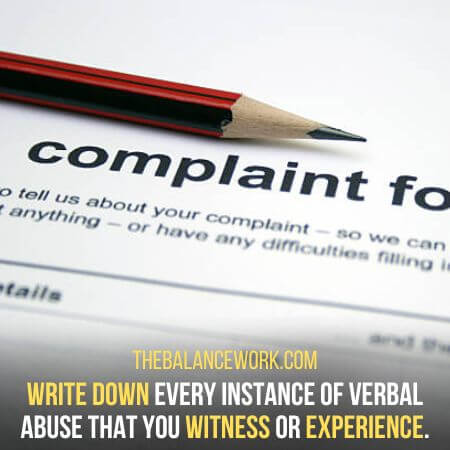If you’re the victim of verbal abuse at work, you must know that you have options. You can and should report your coworker’s behavior to HR. But how to report a verbally abusive coworker can be tricky.
Remember that verbal abuse is a form of harassment and illegal. Your employer is required by law to take steps to stop the harassment and protect you from retaliation.
10 Steps To Report A Verbally Abusive Coworker
Sometimes, the best way to deal with a verbally abusive coworker is to confront them directly. This isn’t always possible or advisable, though.
If you don’t feel safe confronting your coworker, or if you’ve tried and it hasn’t worked, you can report their behavior to HR.
Here are the tips to ensure that your complaint is seriously taken:
1. Keep A Written Record Of Abuse:
This is important for two reasons. First, it will help you remember the details of the abuse when you report it.
Second, it will provide HR with a written record of the behavior. A written record is much more persuasive than your word against your coworker.

Keep a notebook with you at work. And write down every instance of verbal abuse that you witness or experience.
For instance, you might write down:
“Today, at 3 pm, Joe screamed at me in front of everyone in the break room. He said, ‘You’re so stupid. I can’t believe you did that!’
I felt embarrassed and humiliated.”
Or,
“Yesterday, Joe told me I was ‘lazy and worthless and should just quit because I’m not cut out for this job.’
I felt so devalued and humiliated that I went home in tears.”
2. Keep CCTV Footage As Proof:
If the verbal abuse happens in a place with CCTV footage, make sure to save it. This can be necessary evidence in your case.
You can find out how to do this by asking the security guard or IT department. Usually, you’ll need to request in writing.
Your employer might not hand over the footage if it’s considered company property.
In this case, it’s still worth asking for it. You can say you’re willing to pay for the cost of copying the footage.
Or you can ask them to let you view the footage in person so you can take your notes.
Moreover, once you have filed the complaint to HR, you can request them to order the footage for evidence.
It will be helpful if the footage shows:
– The date and time of the incident
– What they said or did
– Who was present
– The reaction of the victim
3. Find Witnesses:
If other people witnessed the verbal abuse, ask them to make a statement. This can be crucial evidence in your case.
You might be able to find witnesses by:
– Asking people who were there at the time of the incident
– Checking CCTV footage
– Speaking to people who work nearby
Some witnesses might be reluctant to get involved. They might get worried about retaliation from the abuser. Or they might not want to get involved in a workplace dispute.
If this is the case, you could try to find another witness who can corroborate their story. For instance, if one person saw the abuse but didn’t hear it. You could find someone else who saw and listened to what happened.
And when you speak to witnesses, ask them to provide as much detail as possible. This will help to make your case stronger.
You can ask them questions like:
– What did you see/hear?
– When did it happen?
– Where were you when it happened?
– Who was present?
– What was the reaction of the victim?
And you can prepare them for meeting HR if they need to give a formal statement.
4. Record Time, Date:
Keep a record of when the incidents occurred. This will help to show that the behavior is ongoing and not just a one-off incident.
It will also help to show how the behavior is affecting your work. For instance, if you’re struggling to concentrate. Or getting less job done because of the abuse.
Time and date authenticate your complaint and provide HR with a timeline of events.
Also, try to include as much detail as possible in your records.
5. Gather Medical Documentation:
Ask for copies of your medical records if you’ve seen a doctor or therapist because of the abuse. This can be crucial evidence in your case. Medical records can help show the effect the abuse has on your health.
For instance, if you’re experiencing anxiety, depression, or sleep problems.

And if you haven’t seen a doctor or therapist, you could consider doing so. They can provide you with a diagnosis and treatment plan.
They can also give you a note to give to your employer. This can explain how the abuse is affecting your work.
6. Collect Emails And Other Communications:
If the abuser has sent you abusive emails or text messages, save them as evidence. This
can be crucial evidence in your case.
You can also save any other communications that are relevant to the case. For instance, if the abuser has made comments on social media.
Or they texted you in a mad moment and then apologized later. When collecting this evidence, ensure to include the time, date, and sender/recipient of each message.
Also, keep a screenshot of any relevant social media posts. You can take a screenshot by pressing the “Print Screen” button on your keyboard. Or you can use the “Snipping Tool” on Windows.
7. Prepare Case:
Now that you’ve gathered all the evidence, it’s time to prepare your case. Start by writing a formal complaint letter to HR.
In the letter, explain what happened and why you’re making the complaint.
Attach all the evidence that you’ve gathered to the letter. And make sure to keep a copy of the letter and all the proof for your records.
A sample complaint letter might look something like this:
Sample Complaint Letter 1:
“Dear HR,
I am writing to formally complain about verbal abuse against my coworker, John Doe.
This behavior has been ongoing for the past month. It has harmed my work and health.
I have attached evidence of the abuse to this letter. Including emails, text messages, and medical records.
I believe this behavior constitutes a hostile work environment. And I would like the matter to be investigated as soon as possible.
Thank you for your time.
Sincerely,
Your name”
Sample Complaint Letter 2:
“Dear HR,
This is a complaint letter for harassment against my coworker, John Doe.
On June 1st, 2020, John made explicit comments to me during a team meeting.
I told him to stop, and he apologized. But he has made similar comments on other occasions.
This behavior is unwelcome, unprofessional, and makes me feel uncomfortable at work.
I have attached a screenshot of the June 1st incident to this letter.
I want John to investigate this behavior. And they should receive counseling or training on proper workplace conduct.
Thank you for your time.
Sincerely,
Your name”
Sample Complaint Letter 3:
“Dear HR,
My coworker, Jane Doe, has been verbally abusing me for the past week. She yells at me, calls me names, and makes personal attacks.
This behavior is affecting my work performance and mental health.
I have attached evidence of the abuse to this letter, including a note from my therapist.
Thus, I am writing a formal complaint and would like Jane to be reprimanded for her behavior.
I would also like to receive counseling or therapy to help me deal with the aftermath of this abuse.
Thank you for your time.
Sincerely,
Your name”
8. Make the Complaint:
Once you’ve prepared your case, it’s time to make the complaint. You can do this by going to HR or another designated person at your company.

You can look at your company’s employee handbook if you’re unsure who to go to.
This should have a section on how to make a complaint. When you make the complaint, be sure to be clear and concise.
Attach all the evidence that you’ve gathered and make copies for HR. Some companies have a complaint form that you’ll need to fill out.
If so, include all the relevant information on the form. Once you’ve made the complaint, HR will investigate the matter.
9. Request Anonymity:
If you’re worried about retaliation, you can request anonymity. Your name will not get shared with the abuser during the investigation.
To do this, state your request in the complaint letter. HR should then take steps to protect your identity.
Usually, this means keeping your complaint confidential. And only sharing it with those who need to know.
It is your right to request anonymity, but HR may not be able to guarantee it. In some cases, they may need to reveal their identity to the abuser to conduct a fair investigation.
10. Follow Up:
Once you’ve made the complaint, it’s essential to follow up. This means staying in contact with HR and keeping track of the investigation.
If you don’t hear back from HR, follow up with them after a few days. And if the abuse doesn’t stop, don’t hesitate to make another complaint.
Abuse can be difficult to deal with, but you don’t have to suffer in silence.
Why Is It Important To Complain About Workplace Abuse?
If you think coworker abused you, speak up and make a formal complaint. With the proper evidence, you can get the help you need and put an end to the abuse.
You have to take action because:
1. You Deserve Respect:
No one deserves to get mistreated at work. If coworker abused you, it’s not your fault. The abuser is the one in the wrong, not you.
Respect is something that everyone deserves, no matter who they are or what they do. You should never have to endure abuse, no matter the circumstances.
2. The Abuse Might Not Stop Without a Complaint:
In many cases, the abuse will only stop if you make a formal complaint. This is because the abuser might not realize their behavior is a problem.

They might think that their behavior is normal or even acceptable. And unless someone tells them otherwise, they’re not going to stop.
Thus, by making a complaint, you can help the abuser realize that their behavior is wrong and needs to change.
3. You Have The Right To A Safe Workplace:
Under the law, you have the right to a safe workplace. This means that your employer has a responsibility to protect you from abuse.
If they don’t take action to stop the abuse, they could be breaking the law. In some cases, you might even be able to sue your employer for failing to protect you.
And even if you can’t take legal action, making a complaint is still essential. This is because it can help make your workplace safer for everyone.
4. It Might Get Worse If You Don’t Complain:
If you don’t speak up, the abuse is likely to continue. In some cases, it might even get worse. The abuser might think that they can get away with anything,
And they might start to act even more aggressively. By making a complaint, you can help put a stop to the abuse before it gets worse.
Final Words:
Workplace abuse is a serious problem. To make sure it doesn’t happen to you, it’s essential to know what to do.
If coworker abused you, don’t suffer in silence. Speak up and make a formal complaint. With the proper evidence, you can get the help you need and put an end to the abuse.
Last Updated on 15 hours by Shahzaib Arshad
- Why Does My Boss Wink At Me? 6 Potential Reasons - October 5, 2023
- Is It Legal For Your Employer To Call Your Doctor? No, But… - October 4, 2023
- 12 Ways To Deal With A Low IQ Person - September 22, 2023